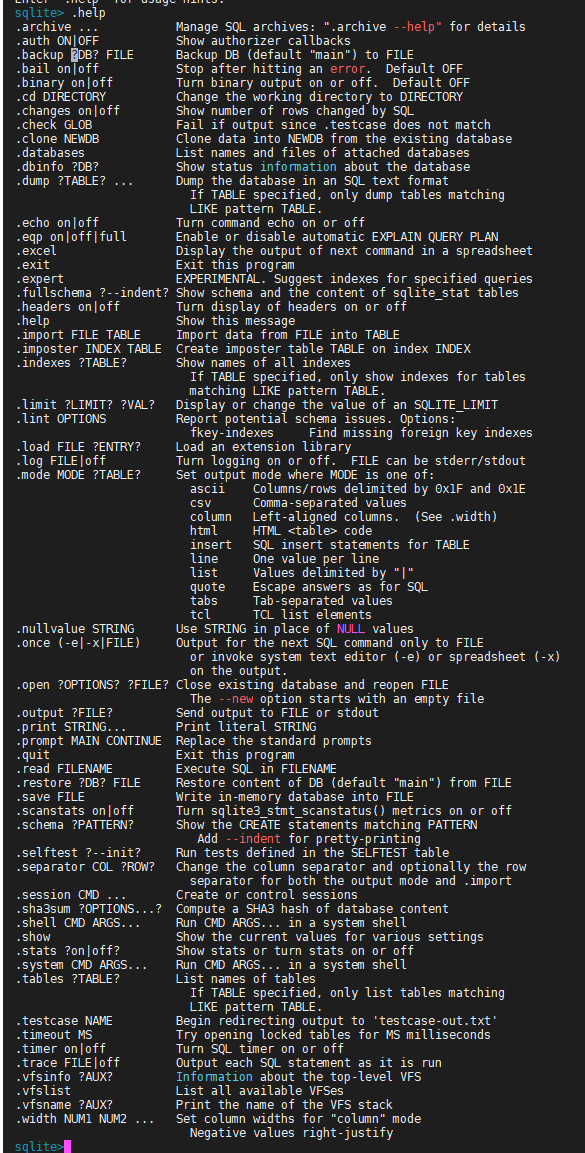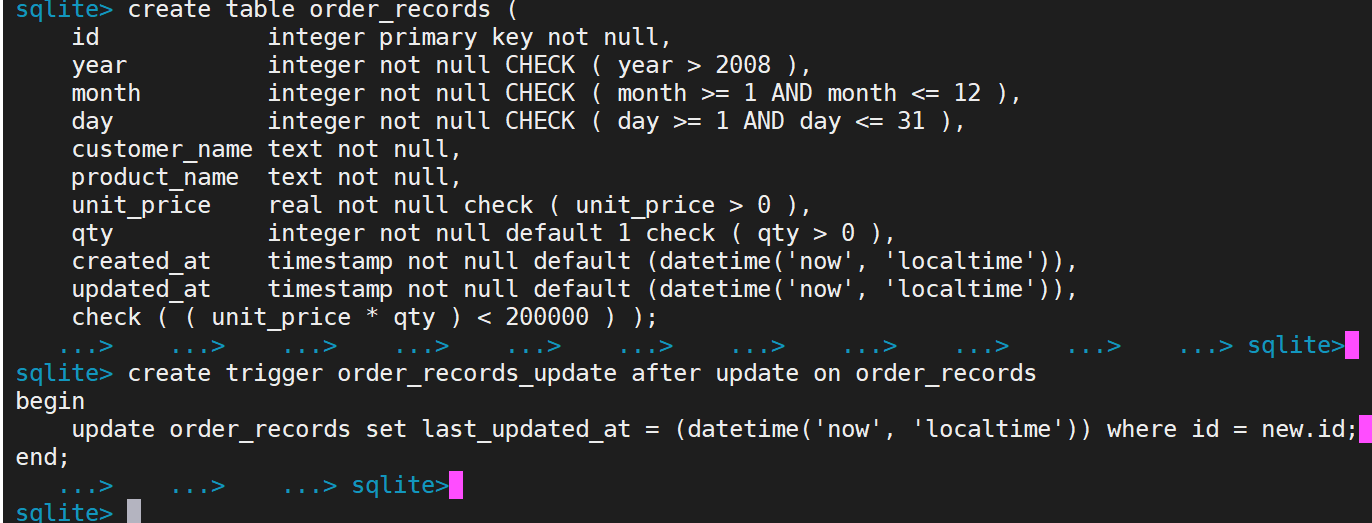SQLite 3 のインストール,データベース作成,テーブル定義とレコード挿入(Ubuntu 上)
Linux での,SQLite 3 のインストール,起動と終了,データベースの新規作成,テーブル定義の手順をスクリーンショットで説明する.
SQLite 3は,リレーショナルデータベース管理システム.
SQLite 3は次の特徴を持つ.
- アカウント(ユーザ名やパスワード)の機能がない
- SQLite 3 には「サーバクライアント」という考え方がない
- 設定なしでも動く
【目次】
- SQLite バージョン 3 コマンドライン・インタフェースのインストール(Ubuntu 上)
- SQLite 3 の起動と終了,ヘルプの表示,エンコーディングの確認
- 空のデータベースの新規作成
- テーブル定義
【サイト内の主な SQLite 3 関連ページ】
1. SQLite バージョン 3 コマンドライン・インタフェースのインストール(Ubuntu 上)
* Ubuntu での実行手順例
# パッケージリストの情報を更新
sudo apt update
sudo apt -y install sqlite3

2. SQLite 3 の起動と終了,ヘルプの表示,エンコーディングの確認
Linux の端末 (terminal) で,次の操作を行う.
- SQLite 3の起動
このとき,データベース名として /var/tmp/mydb を指定する.SQLite 3の流儀で,データベース名はファイル名になる.
* データベース名はなんでも良いが、英文字と数字のみを使うのが良い.
* データベース名は「../hoge」のような相対パス形式でもいいし,カレントディレクトリを使うつもりで「hoge2」のようにしてもいい.
sqlite3 /var/tmp/mydb
- ヘルプの表示
「.help」で,ヘルプが表示される.
.help
- 現在使用中のデータベースについての,文字のエンコーディングの確認 (encoding)
「PRAGMA encoding;」で,エンコーディングが表示される.
PRAGMA encoding;
- SQLite 3の終了
「.exit」で終了.
.exit
3. 空のデータベースの新規作成
ここでの設定
- 生成したいデータベースファイル名: /var/tmp/hoge.db ※ 書き込み権限のあるディレクトリを使用するのが良い
- SQLite を実行する.
sqlite3
- データベースの新規作成
空のデータベースを作成したいので次のように操作.
「--new 」を付けているので,すでにデータベースファイルが存在するときは,その中身を空にする.
.open --new /var/tmp/hoge.db
- 「.exit」を実行して,SQLite 3 を終了.
.exit
4. テーブル定義
ここで定義するテーブル: P(id, name, weight)
- SQLite を実行する.
sqlite3
- データベースの新規作成
空のデータベースを作成したいので次のように操作.
「--new 」を付けているので,すでにデータベースファイルが存在するときは,その中身を空にする.
.open --new /var/tmp/hoge.db
- SQL を用いたテーブル定義
create table order_records ( id integer primary key not null, year integer not null CHECK ( year > 2008 ), month integer not null CHECK ( month >= 1 AND month <= 12 ), day integer not null CHECK ( day >= 1 AND day <= 31 ), customer_name text not null, product_name text not null, unit_price real not null check ( unit_price > 0 ), qty integer not null default 1 check ( qty > 0 ), created_at timestamp not null default (datetime('now', 'localtime')), updated_at timestamp not null default (datetime('now', 'localtime')), check ( ( unit_price * qty ) < 200000 ) ); create trigger order_records_update after update on order_records begin update order_records set last_updated_at = (datetime('now', 'localtime')) where id = new.id; end;
- SQL を用いたレコード挿入
begin transaction; insert into order_records (id, year, month, day, customer_name, product_name, unit_price, qty) values( 1, 2023, 7, 26, 'kaneko', 'orange A', 1.2, 10 ); insert into order_records (id, year, month, day, customer_name, product_name, unit_price, qty) values( 2, 2023, 7, 26, 'miyamoto', 'Apple M', 2.5, 2 ); insert into order_records (id, year, month, day, customer_name, product_name, unit_price, qty) values( 3, 2023, 7, 27, 'kaneko', 'orange B', 1.2, 8 ); insert into order_records (id, year, month, day, customer_name, product_name, unit_price) values( 4, 2023, 7, 28, 'miyamoto', 'Apple L', 3 ); commit;
- 確認表示
select * from order_records;
- 更新し確認表示
begin transaction; update order_records set unit_price = 11.2 where id = 1; commit; select * from order_records; - 「.tables」を実行して,テーブルが定義できたことを確認.
.tables
- 「.exit」を実行して,SQLite 3 を終了.
.exit
![[kaneko lab.]](https://www.kkaneko.jp/info/logo_png.png)